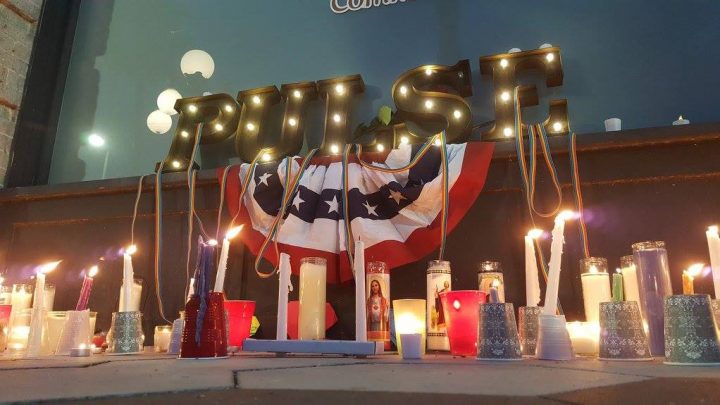Grief, anger, calls to action follow Pulse attack; GOP concedes to gun debate following filibuster

Grief, anger and calls to action filled the week following last Sunday’s massacre at Orlando’s Pulse nightclub. A lone gunman used an AR 15-type assault rifle and a semi-automatic handgun to murder 49 people in the popular bar that catered to a diverse, predominantly LGBT clientele. It was Latin Night at Pulse, and most of the victims were people of color. FSRN’s Nell Abram has more.
President Barack Obama traveled to Orlando Thursday and met with survivors and victims’ families.
“For so many people here who are lesbian, gay, bisexual, transgender, the Pulse Nightclub has always been a safe haven, a place to sing and dance, and most importantly, to be who you truly are — including for so many people whose families are originally from Puerto Rico,” President Obama said, speaking at a makeshift memorial for the dead. “Sunday morning, that sanctuary was violated in the worst way imaginable. So whatever the motivations of the killer, whatever influences led him down the path of violence and terror, whatever propaganda he was consuming from ISIL and al Qaeda, this was an act of terrorism but it was also an act of hate. This was an attack on the LGBT community.”
Police killed the gunman,identified as Omar Mateen, after a three-hour standoff. The FBI had interviewed Mateen on three occasions since 2013, but ultimately determined he was not a threat. The 29-year-old of Afghan descent had a history of domestic violence. People who knew him say he was both aggressive and homophobic, yet some survivors say they had seen him at Pulse on multiple occasions.
Despite reports that the shooter claimed allegiance to ISIS during the attack, Obama reiterated that there is there is no evidence any organized terror group was behind the massacre. The shooter’s motivations remain a mystery, with much speculation centering around the intersection of a culture of hate, whether internalized or externalized, and extremist ideology.
The LGBT community and their allies have taken their mourning to the streets in cities and towns nationwide, and shows of solidarity took place around the world.
Ashley Green spent last Sunday glued to the news, hoping to see friends in the live shots, while fearing she’d hear their names listed among the dead. Instead, she saw some of the state’s most vitriolic anti-LGBT lawmakers, including Florida’s Republican Senator, its Governor and the state Attorney General.
“And I started to see Marco Rubio, Rick Scott and Pam Bondi, people who have literally threatened the safety of the very people at that club – get up and talk about mourning, talk about how we need to stand up against terrorism, ” Green, a activist with the Tampa Bay Area Dream Defenders, said. “And I want to know if they mourned when they fought for bathroom bills, when they fought against anti-bullying bills, when they fought against gay marriage when they fought against [gay] people in the military, when they fought to get families deported, when they fought or got up and made a stump speech a kid that was at that club that night had to hear some racial slur about going back to their country.”
Calls for, and arguments against, gun control were swift. Anger and frustration were evident on Capitol Hill as well. When House Speaker Paul Ryan called for a moment of silence Monday night, at least three lawmakers walked out of the chamber, led by Connecticut Representative Jim Hines.
“Silence. Not me. Not anymore,” Hines told his colleagues earlier in the day on the floor of the U.S. House of Representatives. “I will no longer stand here absorbing the faux concern, contrived gravity and tepid smugness of a House complicit in the weekly bloodshed.”
Hines’ indignation was echoed by his colleagues in the Senate, where Wednesday Connecticut Senator Chris Murphy took control of the floor and began what would be a more than 14 hour filibuster, calling Congressional failure to act on gun control measures “unconscionable.”
“There is a new found imperative for this body to find a way to come together and take action to try to do our part to stem this epidemic of gun violence,” the Senator from Connecticut said, “and particularly this epidemic of mass shootings that plagues this nation, and no other industrialized nation in the world. There is something fundamentally different happening in the United States.”
A string of Senate Democrats, and a few Republicans, joined Murphy’s filibuster – posing questions to extend the conversation. Finally just after 2 a.m. Thursday, Murphy yielded the floor, saying the GOP had agreed to schedule a vote on amendments that would expand background checks to gun shows and internet purchases and ban gun sales to suspected terrorists. No date for the votes has been announced.











